No, Americans Should Not Feel Guilty For Showing Solidarity With France
In the wake of the attacks in Paris, some people have argued that American solidarity with France, in contrast to seeming disregard for tragedy elsewhere, is something we should feel bad about. That argument is ridiculous.
In the days since the attacks in Paris, we’ve seen a tremendous outpouring of support for France and the victims of the attacks here in the United States. Iconic buildings such as One World Trade Center have been lit up in the colors of the French flag. Various musical performances over the weekend began with some kind of tribute, including performances of the French national anthem. And every National Football League game on Sunday and last night began with a moment of silence for the victims in Paris. In some quarters, this has led to a backlash that essentially has tried to guilt Americans and other due to the fact that, while they have displayed compassion and support in the wake of the attacks in Paris, there was no similar outpouring of support when bombs went off in Beirut the day before the Paris attack. Others brought up a months-old story about a mass attack earlier this year in Kenya, some implying that it had occurred days before the Paris attack when that was in fact not the case, which Western media allegedly ignored. The obvious implications of all of these criticisms, of course, is that Americans cared more about some lives than others. You can find some examples of these arguments here and here, but there have been plenty of others, along with memes that appeared over the weekend on Facebook and other social media outlets that were clearly designed to make people feel guilty over whatever sympathy they may have been feeling for the people of France.
There is, of course, no denying that the reaction in the United States to the events in Paris have been different from those in the aftermath of what happened the day before in Beirut, and that while the attack in Kenya did get coverage in the Western media when it happened, it got far less attention than the event in Paris. In an article in The Washington Post today, though, attorney Maxim Mayer-Cesiano argues that these criticisms are misplaced and that Americans have nothing to apologize for in their differing reactions to differing events:
This is nonsense. Grief is a personal emotion, and when it’s felt authentically, it is not always fair or proportionate to world demography. Grief is not in the same category as things like voting rights, criminal justice, education or work. It is not a matter for justice. People are allowed to grieve the way they want to grieve. If something moves them more than something else, that is fine. Many people have visited the City of Lights and found meaningful experiences there. Many other people have cherished family, friends or colleagues there who loom larger than an anonymous victim. That affinity doesn’t necessarily come from a hateful, ignorant or otherwise bad place. That’s just being a human and having feelings. No one has the right to police that.
What’s more, that tragedies in Beirut and Paris shouldn’t get the same kind of coverage. Beirut is less than an hour’s drive from Syria, a country wracked by civil war. Internal frontiers shift constantly, rebels battle the government, which battles the so-called Islamic State. The Lebanon-Syria border is porous, and Syrians cross it easily. Beirut itself has been a war zone several times in the last 30 years. Paris, meanwhile, is usually a safe city (the Charlie Hebdo attacks notwithstanding). It is more than 2,000 miles from the war zone, and it’s generally thought to be pretty hard to get inside the European Union from the Middle East, even with the surge of refugees. A week ago, people reasonably had different expectations about which was most vulnerable to Islamic terrorism. It is simply not as surprising when suicide bombers kill 37 people near a prolonged civil war as when six coordinated large-scale attacks unfold in a city that is nowhere near any kind of active conflict, killing 129 (more than triple the total in Beirut). Even the logistics to plan an attack like this, far from the home front, shows a sophistication and scale of operations that transcend our previous understanding of the Islamic State.
Paris, then, defied expectations. That was scary, and it made readers and viewers question what else they have underestimated. No wonder it elicited a much sharper, louder response among the press and among Western social media users. It would be a much better world if all people could have an equal and reasonable expectation of safety, but that’s not the world we live in.
At The Week, Damon Linker makes a similar argument:
There is nothing surprising or shameful about spontaneous expressions of support for France among Americans. France is part of the West, and so are we. France is also America’s oldest ally. Such sentiments — attachment and loyalty to those closer to us in time, space, culture, and history — are perfectly natural. They flow from our tendency to love, first and foremost, what is our own.
I love myself, which is why my instinct toward self-preservation is so strong. Next, I love my family and friends. Then my neighbors. Then those who share my religious, cultural, ethnic, linguistic, ideological, and national background. Then, and only then, can I begin to summon up a comparatively lukewarm love for a universal “humanity.”
These concentric circles of attachment define our natural moral experience. Don’t buy it? Imagine how you would feel at the death of your own child and then compare that to how you feel when you read about the death of a child on the other side of the world whose family, culture, language, and background are foreign to you. The second of these deaths cannot help but be felt abstractly.
Now, this obviously isn’t the end of the story. Moral traditions that descend from Christianity and Kantian liberalism often think of moral obligation exclusively in universal terms. Kant maintained that each of us has an unconditional duty to treat every human being as an end and never merely as a means, and to disregard natural inclinations when determining how to act morally in the world. The most stringent forms of Christianity likewise demand that we actively love our neighbors, our enemies, and even all human beings, regardless of their worthiness of that love. Both moral systems would seem to require that I treat each child — my own and one from a family of strangers 7,000 miles away — as morally interchangeable.
Whether or not a universal moral system is possible or desirable, we need to recognize that it cuts against the grain of human nature, and that a more “natural” form of morality — one that builds on and refines our natural loves and inclinations rather than denying their legitimacy — isn’t the outrage that universalists often presume it to be.
To simplify Linker’s arguments greatly, it is completely understandable human nature that people end up being more deeply impacted by tragic, or euphoric, events that there are closer to them in some sense than those that are not. The bluntest example, of course, is the fact that people will generally be more deeply impacted by the death of a close family member or friend than they are by the death of someone they barely knew, but this is a tendency that extends far beyond that. The death of a beloved former President of the United States, for example, is going to be bigger news than the death of the long-serving leader of some other country, and tragic events close to home or in a location that our nation has some close connection to are going to have a more significant impact than those that occur far away. One of the first times I recall thinking deeply about this issue was in a college Philosophy class in which the Professor brought up the twin examples of the 1986 Challenger disaster and the death of seven Americans, which had occurred just a few years earlier at the time, to a train crash in a remote part of India in which hundreds of anonymous people lost their lives. The question, obviously, was why we cared more about one rather than the other, and why one event would receive far more widespread news coverage than the other. At the time, I recall thinking that the Professor was, in some sense, trying to do the same thing that many of the critics in the days after Paris have been doing and imbue a sense of guilt into those of us who believed at the time that it was only natural to be more deeply impacted by the Challenger disaster than the hypothetical train disaster in India. Given that’s it’s been more than twenty years since that class conversation, I don’t recall everything that was said nor how we ended up resolving the question, assuming we ever did. However, it strikes me now that both Mayer-Cesiano and Linker have the answer to that question, and the criticisms of Americans who have reacted strongly to the events in Paris, pretty much right.
The events in Paris are arguably more significant to most Americans largely because of the fact that Paris is a city most of us are at least familiar with in some way even if we haven’t visited there. It’s been the setting for countless movies and television shows over the years, it was liberated by American troops in World War Two, and has as significant a reputation in the Western world as London, Rome, and New York City. The idea that an attack like the one that happened on Friday night could happen there packs an emotional punch in no small part because of this connection, and because it serves as an uncomfortable reminder that the sense of relative safety we’ve had for many years now even in the wake of the September 11th attacks could be punctured quite easily without warning. Finally, there’s the fact that, notwithstanding disagreements over the years, France and the United States have a long-standing alliance that goes back to the days when the Marquis de Lafeyette and the French fleet were helping George Washington and the Continental Army defeat the British and secure American independence. It’s only natural that something that happens in France, or in London, or elsewhere in Europe, would have a deeper impact on Americans than something that happens in a part of the world that they are unfamiliar with and which, to be completely blunt about it, isn’t very important to American national interests.
Similarly, it is entirely understandable that the events in Paris are getting broader media coverage than events in other parts of the world. For one thing, it’s simply a fact that Paris is a major Western media center, which means that American news outlets, which were just beginning their late afternoon/early evening news coverage when the attacks began last Friday, would have more access to words, pictures, and eyewitness accounts than they would in other parts of the world where, for many reasons, there aren’t many, if any, western reporters on the ground and local media isn’t as robust so that American networks can tap into the coverage of local stations the way they have frequently since Friday. Furthermore, those who have argued that there was no coverage of the events last Thursday in Beirut, or in Kenya earlier this year are simply incorrect. A Google News Search shows pages of stories about the Beirut attack in the day after the attack, for example, and the same is true for the attack in Kenya on April 2nd, both in the day after the attack and indeed the entire month of April. Additionally, last year’s coverage of the abduction of hundreds of Nigerian schoolgirls by a Muslim terrorist group received widespread attention here in the West, including from the White House, and widespread coverage in the media. To a large degree, then, the accusations of callousness and failure to pay attention to acts of terrorism outside the West are quite simply nonsense. At the most, all the one can say about the fact that people are more likely to be aware of what happened in Paris than they are what happened in Beirut, Kenya, or Nigeria is a reflection of the fact that many people don’t pay attention to international news to begin with.
So no, Americans should not feel guilty about showing solidarity with the people of Paris, and the people who are arguing they should are, to be blunt, full of utter nonsense.
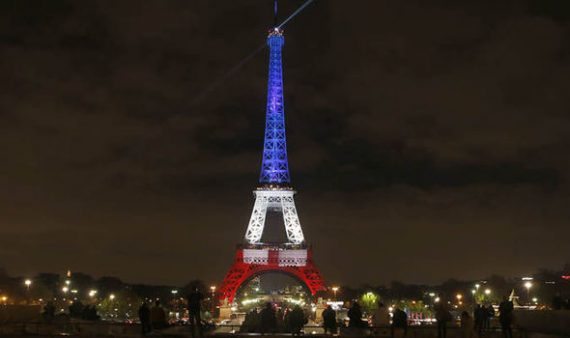

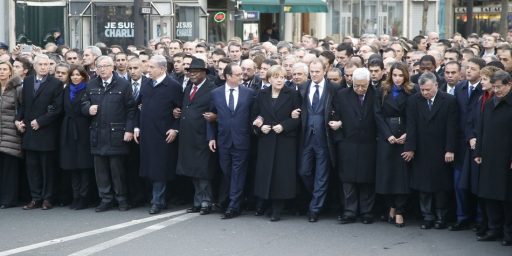
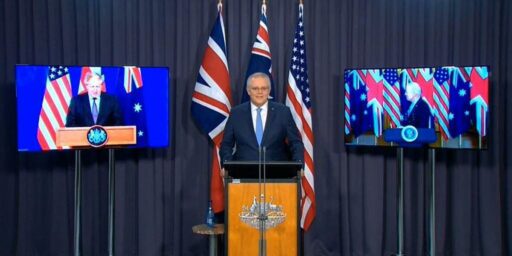
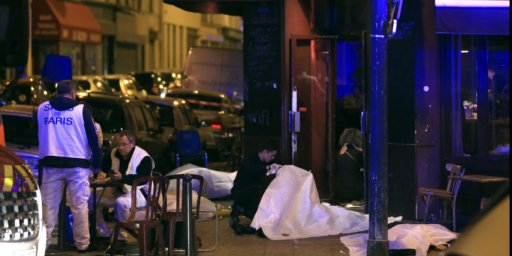
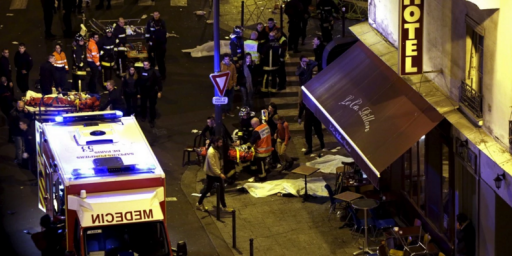
I totally agree that our reaction is reasonable given our emotional proximity to Paris. I do wish, however, that we (Americans) could learn from the reactions from other victims of terrorism around the world (even the French, Spanish and English past victims) and comport ourselves in a more calm and rational way rather than the national narcissistic freakout we seem to engage in regularly.
They were after all our very first ally….
It’s a perception thing. Empathy and sympathy. How many people in America and Europe would likely to been to Beirut or Kenya in their lives or even think of going there? Now how many can say the same of Paris as a destination?
Your average viewer may have imagined walking the Champs Elysees and drinking wine on a balcony with a lovely view of the Eiffel Tower. Which means it could have been them in that crowd – there’s a visceral connection to the Paris of their imagination and the scenes on their TV. People have honeymooned there, left locks on bridges, went on school exchange trips…. watched it on TV so much they feel they know it the way audiences think they know NYC. It could have been them.
How many viewers can even tell you where Beirut is on the map, let alone something they’d want to see there? They’ve never imagined the centuries old gardens or grand museums – hell, they probably don’t even know you can ski nearby! They have no dreams of the streets that run with blood so they don’t feel that connection. It would never have been them.
Empathy =/= sympathy. We sympathize with Beirut, Kenya, Syria, all those places we can’t really picture ourselves or our circumstances. That’s how people can turn away refugees as it never occurs to them how it would feel to flee hundreds of dangerous miles for your life only to meet with armed men, angry faces and a GTFO attitude. We’ve never done that so we offer advice. We empathize with France, tell them we feel their pain and understand their circumstances. We feel we’ve been there, done that so we offer hope and a hand up.
Perceptions, nothing more then how we relate to the world.
We should feel more for victims in Lebanon and Nigeria than we do. But that is not a reason to fail to express sorrow and solidarity with the French. They certainly did after 9/11.
@Bill Lefrak: I occasionally travel to the Hampton/Virginia Beach area. This is where in 1781 the French Fleet fought the Battle of the Chesapeake, preventing the British fleet from reinforcing Cornwallis’ army at Yorktown and allowing the French to reinforce Washington and Rochambeau, thereby effectively winning the Revolution.
I think the mayor hit the nail on the head. We’ve become inured to violence in places like Beirut, which, for a long time, was synonymous with civil war and ethnic strife. It’s more shocking when something like this happens in Paris, which hasn’t seen a war in 70 years.
“Lafayette, we are here!”
It is if you’re a modern American conservative.
The evidence for this is the repeated instances of conservative politicians and demagogues reversing their long-held and hard-fought conservative positions when confronted with a friend or family member (as opposed to a stranger) who would be harmed by them. They lack the imagination to make the empathetic leap before having their noses rubbed in it, but their principles are no match for their empathy when reality comes calling close to home.
@KM: Also,, Kenya is so much further away that the time it takes for any news to get here from that country could account for the lack of attention.
#AllLivesMatter
I forgot, it’s different because we’re talking about white people now.
It’s also because we probably think: “oh, yet another bomb going off in Beirut. Isn’t that situation normal?”
That’s the problem when your country comes out of a distressingly long war. The rest of the world basically has already written you off.
I think that, in many ways, London, NYC and Paris are the cultural capitals of the West. Additionally, France, the UK, and the US have been treaty allies and fought on the same side of every major global conflict for over 100 years.
You don’t even have to travel as far as Beirut or Kenya to see the difference in reaction.
Paris now versus the Madrid train bombings. Charlie Hebdo versus the shooting up of the youth camp in Norway.
Two instances of terrorism in the West, relatively close to home, but outside of the cultural capitals, without the same shared 20th century political history.
I really think that they only other places that *might* have similar emotional resonance for Americans would be Toronto or Montreal or Vancouver.
@grumpy realist: When thinking of how we view the Mideast now, I am reminded of the Transformers cartoon, from the mid-1980s, and the fictional Mideast country of … (wait for it) … Carbombya!
I don’t think we’ve come all that far in how we view violence in the Mideast.
No, Americans shouldn’t feel guilty about showing solidarity with France because we haven’t paid enough attention to attacks in Beirut., Kenya and other places.
Americans (or at least a certain vocal subset of them) should feel guilty because the Paris attack was a long-run consequence of our idiotic war of choice that the French tried to stop over 12 years ago. Then, they got called “cheese-eating surrender monkeys” and worse for their trouble. Now it turns out we cost them over a hundred dead and hundreds more wounded. That is why Americans should be ashamed.
The very fact that we would have to wonder if we should feel guilty about showing solidarity with France at this time shows just how juvenile we can be.
I would hope that the era of “Freedom Fries” would be in the rear view mirror, receding into the cesspool mists that spawned that idiocy. Maybe, maybe not.
Can we once again buy ‘French Fries’ in the Capital cafeteria?
@al-Ameda:
Of course the people that wanted ‘freedom fries’ and ‘freedom toast’ are now saying ‘je suis Paris’ and demanding that we accept no refugees. What a difference political expedience makes.
@Console: ‘talking about white people now” : this is not some racial issue. It is about a group of people who are evil and want to destroy anything that is good, civilized, or just kill for the fun of it.
There is no racism in all of this. So don’t try to pull that on us.